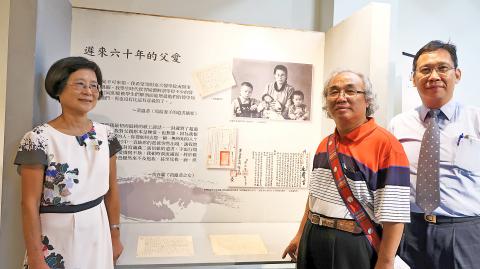Letters written by White Terror-era political prisoners to their families are on display in Pingtung.
The White Terror era refers to the suppression of political dissidents following the 228 Incident, an uprising that began on Feb. 27, 1947, which was brutally suppressed by the then-Chinese nationalist Party (KMT) regime, and the later imposition of martial law, which was not lifted until July 15, 1987.
During the White Terror, 140,000 to 200,000 people — many of whom were considered intellectual and social elites — were imprisoned and more than 1,000 were killed.

Photo: Lo Hsin-chen, Taipei Times
The exhibition, titled Belated Love: Farewell Letters of the Politically Persecuted in the White Terror Era (遲來的愛— 白色恐怖時期政治受難者遺書特展), has been put together by the Ministry of Culture and the Pingtung County Government.
It displays farewell letters from 10 victims of political persecution, including Huang Wen-kung (黃溫恭), Ho Chuan (何川), Huang Tien (黃天), Kao Yi-sheng (高一生), Huang Hsien-chung (黃賢忠), Wang Yao-hsun (王耀勳), Kuo Ching (郭慶), Tsai Tieh-cheng (蔡鐵城), Chen Chen-chi (陳振奇) and Chiu Hsing-sheng (邱興生).
“I was only five months old when my father [Huang Wen-kung] was arrested. I cried when I first read his farewell letter,” National Kaohsiung Marine University professor Huang Chun-lan (黃春蘭) said on Friday.
Huang Chun-lan said her father was born in Kaohsiung’s Lujhu District (路竹) and was the first dentist in the area.
After the 228 Incident, her family relocated to Pingtung’s Chunrih Township (春日), where he worked as the director of the township’s health center and improved hygienic conditions for Aboriginal communities and the survival rate of newborn infants, she said.
Huang Wen-kung wrote five farewell letters to his family before his execution in 1953, but they were only given to his family 58 years after his death, department director Wu Ching-fa (吳錦發) said.
“My dearest Chun-lan: While you are still in your mother’s womb, I have been arrested. How sorrowful it is that we cannot see each other in person. Nothing is more miserable than this,” one of the letters said.
It has been 30 years since the lifting of martial law, but most people have only a fragmented understanding of the time, Wu said.
The government is obliged to ensure historical justice for the families of the persecuted and to give the next generation access to the historical truth, she added.
The letters are valuable because they are the last confessions of the politically persecuted, who wrote them on the eve of their executions, Preparatory Office of the National Human Rights Museum editor and reviewer Tu Chien-feng (杜劍鋒) said.
Hopefully, through the letters, more people could learn how the persecuted died for their ideals, he added.
The exhibition is to run untill Oct. 15 at the county government’s Cultural Affairs Department.

Alain Robert, known as the "French Spider-Man," praised Alex Honnold as exceptionally well-prepared after the US climber completed a free solo ascent of Taipei 101 yesterday. Robert said Honnold's ascent of the 508m-tall skyscraper in just more than one-and-a-half hours without using safety ropes or equipment was a remarkable achievement. "This is my life," he said in an interview conducted in French, adding that he liked the feeling of being "on the edge of danger." The 63-year-old Frenchman climbed Taipei 101 using ropes in December 2004, taking about four hours to reach the top. On a one-to-10 scale of difficulty, Robert said Taipei 101

Nipah virus infection is to be officially listed as a category 5 notifiable infectious disease in Taiwan in March, while clinical treatment guidelines are being formulated, the Centers for Disease Control (CDC) said yesterday. With Nipah infections being reported in other countries and considering its relatively high fatality rate, the centers on Jan. 16 announced that it would be listed as a notifiable infectious disease to bolster the nation’s systematic early warning system and increase public awareness, the CDC said. Bangladesh reported four fatal cases last year in separate districts, with three linked to raw date palm sap consumption, CDC Epidemic Intelligence

Two Taiwanese prosecutors were questioned by Chinese security personnel at their hotel during a trip to China’s Henan Province this month, the Mainland Affairs Council (MAC) said yesterday. The officers had personal information on the prosecutors, including “when they were assigned to their posts, their work locations and job titles,” MAC Deputy Minister and spokesman Liang Wen-chieh (梁文傑) said. On top of asking about their agencies and positions, the officers also questioned the prosecutors about the Cross-Strait Joint Crime-Fighting and Judicial Mutual Assistance Agreement, a pact that serves as the framework for Taiwan-China cooperation on combating crime and providing judicial assistance, Liang

US climber Alex Honnold left Taiwan this morning a day after completing a free-solo ascent of Taipei 101, a feat that drew cheers from onlookers and gained widespread international attention. Honnold yesterday scaled the 101-story skyscraper without a rope or safety harness. The climb — the highest urban free-solo ascent ever attempted — took just more than 90 minutes and was streamed live on Netflix. It was covered by major international news outlets including CNN, the New York Times, the Guardian and the Wall Street Journal. As Honnold prepared to leave Taiwan today, he attracted a crowd when he and his wife, Sanni,